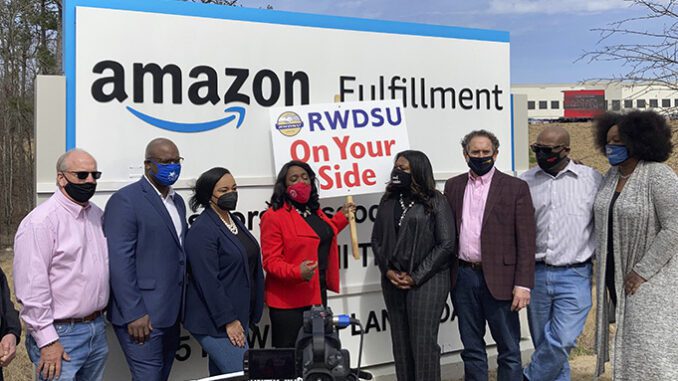
BESSEMER, Ala. — The South has never been hospitable to organized labor. But that may be changing, with an important test in Alabama, where thousands of workers at an Amazon campus are deciding whether to form a union.
Labor organizers and advocates see the David-and-Goliath fight as a potential turning point in the region with a long history of undervalued labor and entrenched hostility to collective bargaining rights. A win could have economic and political ripples for the labor movement and its Democratic Party allies who want a stronger foothold in the South amid decades of dwindling union power nationally.
“This election transcends this one workplace. It even transcends this one powerful company,” said Stuart Appelbaum, national president of the Retail, Wholesale and Department Store Union. “If workers at Amazon in Alabama, in the middle of the pandemic, can organize then that means that workers anywhere can organize.”
The mere presence of a national union figure like Appelbaum in Alabama underscores the stakes.
The Amazon vote comes as Democrats and Republicans are battling fiercely for working-class voters. Over decades, many white workers have drifted toward Republicans, attracted in part by cultural identity and an anti-establishment posture. That’s left Democrats looking to refine their economic pitch, arguing their party is the one fighting for higher wages, better working conditions and more affordable health care.
A win in Bessemer, where the vast majority of the workforce is Black, would have additional significance as a launchpad for new political organizing in the South, where Democrats want to build on recent successes.
That could prove decisive in newfound battlegrounds like Georgia, which Biden pulled into the party’s presidential column for the first time since 1992 and where Democrats won two Senate races. It could be a building block in GOP-dominated states like Alabama and Mississippi. And any domino effect nationally could boost Democrats in old industrial Rust Belt states like Pennsylvania and Ohio, where Republicans have gained ground.
The ongoing mail vote by almost 6,000 workers is the largest union push ever at Amazon, one of the world’s wealthiest companies. The election, which runs through March, also ranks among the largest single organizing efforts in Southern history. It follows a series of failed organizing votes at automobile assembly plants — Nissan in Mississippi in 2017, Volkswagen in Tennessee in 2019, among others — that have flocked to the region over the last three decades.
“Wages in this region have been depressed from the time of slavery,” said historian Keri Leigh Merritt, because “we’ve always had these competing underclasses of different races that white elites,” from the South and elsewhere, “have been able to play off each other.”
The result, Merritt said, is nearly all laborers being paid “below the national market.”
The 2019 median household income in the U.S. was of $62,843, according to Census Bureau data. In Bessemer, part of an industrialized swath outside of Birmingham that once teemed with steel mills, that figure was $32,301.
The union’s election overlaps with Biden and Democrats in Congress pushing the “PRO Act,” legislation that would overhaul labor law to make organizing easier. The bill represents the most significant labor law change since the New Deal era and follows a decades-long slide in union membership. In 1970, almost a third of the U.S. workforce were unionized. In 2020, that number was 10.8%.
The House approved the overhaul Tuesday on a largely party line vote, but it faces almost certain defeat in the 50-50 Senate where major bills require at least 10 Republican votes to avoid a filibuster.
Even without that law, labor leaders say the Amazon result could be a springboard for labor organizing nationwide. Regionally, a win would provide a roadmap for a Southern workforce unaccustomed to unions as a routine part of the economy.
Organized labor’s Southern deficit is glaring: all 11 states of the old Confederacy have so-called “right to work” laws, which allow workers in unionized shops to opt out of paying union dues even as they retain the benefits and job protection negotiated by the union. That weakens unions by reducing their membership and their negotiating leverage. Most Southern states also bar public employees from collective bargaining.
The entire region lags national union membership when measured as a percentage of the workforce. For example, the United Auto Workers has more than 400,000 members, but just 12,000 in Southern states, despite the region’s abundance of internationally owned auto plants and associated suppliers.


